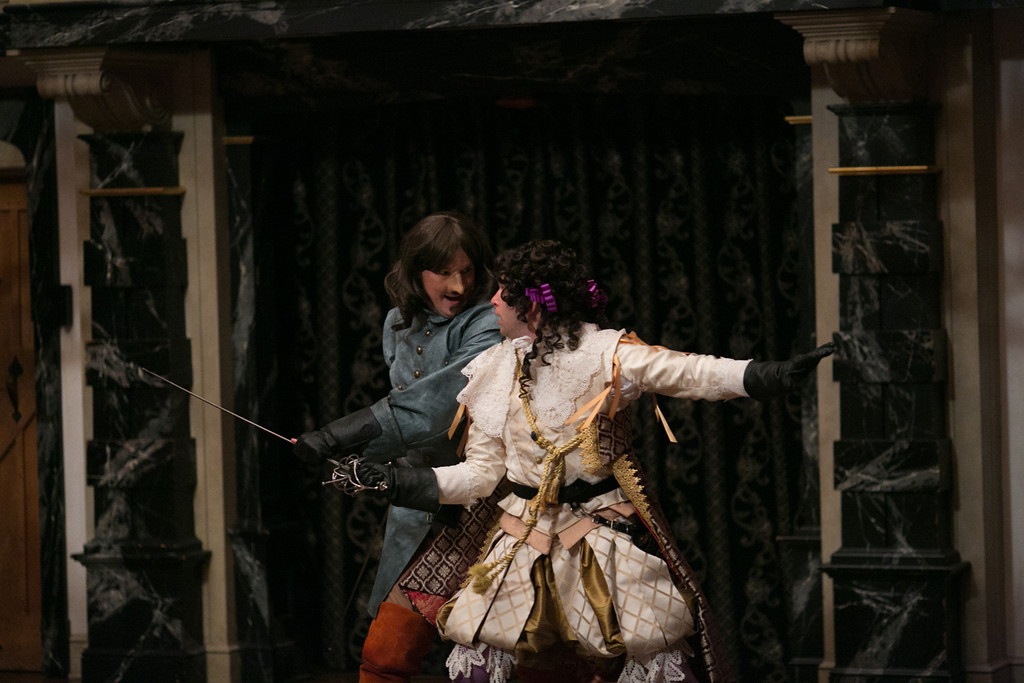Notes from the Director
Big nose, big heart, big love
You might be thinking “Shakespeare didn’t write Cyrano de Bergerac…why is the American Shakespeare Center doing a play not written by Shakespeare?”
Shakespeare only wrote thirty-something plays that have survived (we can debate the exact number in another essay, but the ASC completed the 38-play canon as we celebrated our 25th anniversary early this year). Because the ASC produces sixteen or seventeen plays per year, we need to do plays by other playwrights or we’d run out of shows very quickly. Some of our criteria for choosing non-Shakespeare titles include:
- plays suitable for a lit audience becoming a part of the world of the play (audience contact, no 4th wall);
- plays that echo Shakespeare’s commitment to language;
- plays that thrive in Shakespeare’s Theatre of Imagination;
- plays suitable for use in all of Shakespeare’s Staging Conditions listed elsewhere in this program, especially lights on the audience, unplugged live music/effects, troupe of 15 or fewer actors;
- plays with high entertainment value: either gripping drama or funny comedy or the billion things in between;
- plays that help us create remarkable art using Shakespeare’s Staging Conditions.
Cyrano de Bergerac fits those criteria. It’s a play that’s been done by nearly every major classical theatre company in the world. And one of the joys of this company producing it is that the play’s first scene takes place in 1640 inside a Paris theatre which has a visible audience interacting with each other and the performers very much like our own Blackfriars Playhouse.
In 1897, French playwright Edmond Rostand wrote his play loosely based on the historical Cyrano, who was born a few years after Shakespeare’s death in the early 1600s. Bucking the more “naturalistic” trends of his time, Rostand wrote his romantic and heroic masterpiece in rhyming French alexandrine verse. Many English translations have been written over the last one hundred years: some in rhyming couplets, some in blank verse, and some in prose. The beauty of Rostand’s poetry soars in the translation by Anthony Burgess that we’re using for this production (first performed by Sir Derek Jacobi and the Royal Shakespeare Company in the mid-1980s). Burgess mixes blank verse, prose, and rhyming verse and says in his edition: “My final decision was to use some rhyme, but to avoid couplets except for Cyrano’s big scenes, which have an insolence or lyrical self-confidence to which the relentless unvarying clang of couplets seemed appropriate.”
As Burgess himself has pointed out, critics of the play might complain about its “bald contrivances, the psychological implausibilities, and the gross sentimentality of the ending.” But those critics probably don’t like Romeo and Juliet or A Midsummer Night’s Dream either.
The biggest surprise for me the first time I directed Cyrano was how moved I was by this “sentimental” love story and how timeless the relationships are. If we haven’t actually been the “ugly duckling” with a secret love or the “attractive couple” who “ought to be” perfect for one another, then we’ve probably been one of their friends or known people in those situations. It’s a big play with a big heart that takes no prisoners as it embodies and dissects big love.
Centuries after Shakespeare and the real Cyrano lived, over a hundred years since Rostand first penned his play, our twenty-first century planet needs love this big. Right here. Right now. One of the many diseases we have when we’re young is that we think we’re going to live forever and that we’ve got all the time in the world to do/say/be the things we really want and need. The reality is that we’re not going to live forever and we don’t have all the time in the world. Your life is now. Make it big, make it count.
Jim Warren
Co-founder and Artistic Director











